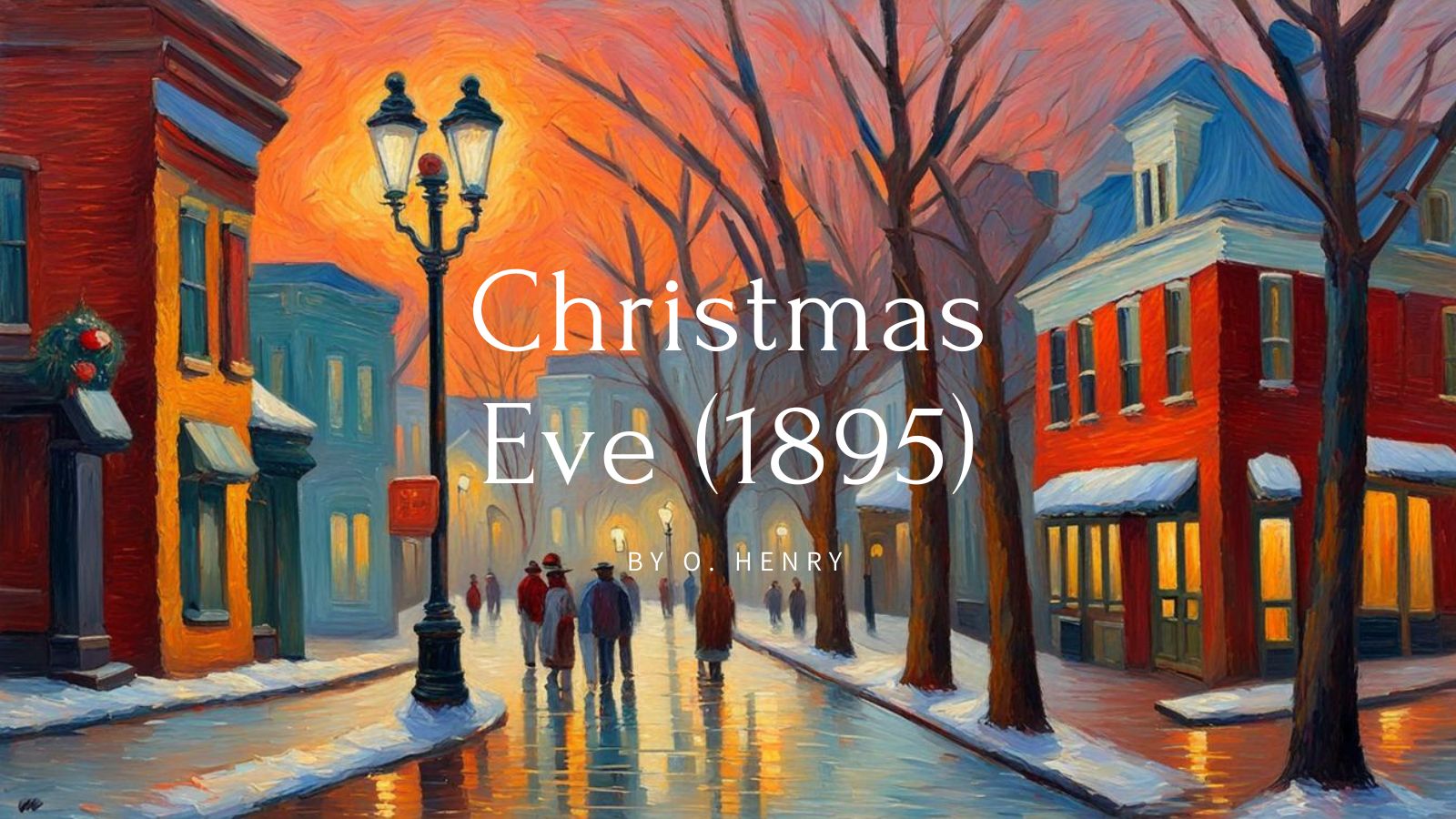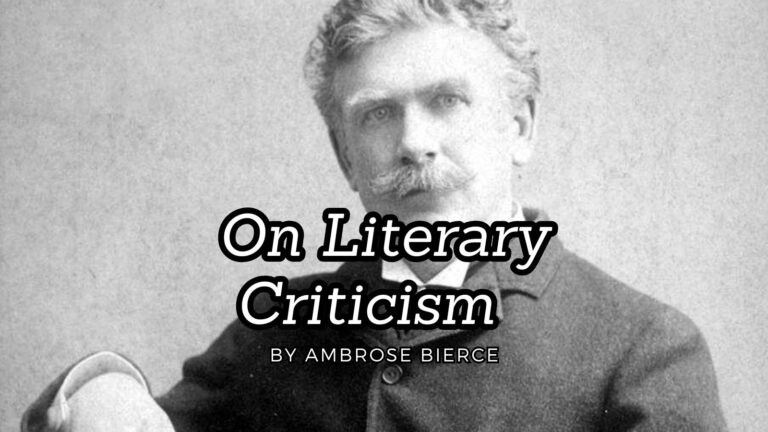Christmas Eve (1895)
by O. Henry
Some Sights and Sounds Caught on Houston Streets and Elsewhere
Houston is a typical Southern town. Although a busy, growing city that is easily holding its place among the half dozen metropolitan cities of the South, it retains most of the old-time Southern customs and traditions.
The all-absorbing haste, the breathless rush, the restless scramble for gain so noticeable in Northern cities is absent here. Houston people are prosperous, and they take things easy, believing that one may gather a few roses of pleasure on the way through life and still keep up with the march of progress. In no city in the South is Christmas more merrily welcomed with social pleasures, the exchanging of friendly offerings, and general rejoicing than in Houston. The immense crowds of people that have lined our streets and stores for the past week testify to the fact.
Yesterday was probably the busiest day among the merchants that the season has witnessed; and there is no question but that it brought to the children anticipations of the brightest nature.
Stand for a few moments on the corner and view the people.
They are moving like a colony of ants, some going, some coming, threading in and out in an endless tangled maze. When the gods lean over the edge of Mount Olympus and gaze down upon this world, while the waiter is out filling their glasses with nectar, they must be highly entertained by the little comedy that is holding the boards on earth. Our world must look to them very much as a great ant bed, over which we crawl and scramble, and run this way and that, apparently without purpose or design.
That light streak across the sky, which we call the Milky Way, is nothing more nor less than the foam spilt from tankards of nectar as the gods quaff and laugh at our strange antics. But it is Christmas eve, and what do we care for their laughter? Turn up the lights; let the curtain rise, and the Christmas crowd is on!
Did you ever watch a young lady buy a Christmas present for her father?
If not, you have missed a good thing.
They all go about it the same way. In fact, young ladies who buy Christmas presents for their fathers are just as sure to perform the operation in exactly the same way, as they are to sit on one foot while reading a novel. She always has just two dollars for this purpose, which is handed her by her mother, who suggests the idea. She goes out late in the afternoon on the day before Christmas. She first goes to a jeweler’s and looks at several trays of diamond studded watches, and wonders which one her father would like. Then, after examining about one hundred diamond rings, she suddenly remembers the amount of money she has, sighs and goes off to a clothing store, where she closely scrutinizes an $18 smoking jacket, and a $40 overcoat. She says she believes she will think over the matter before buying, and leaves. Next she visits a book store, three dry goods stores, two more jewelers, and a candy shop. When Christmas morning comes, her father finds himself the proud possessor of a new red pen wiper with the fifteen cent cost mark carefully erased, and there are to be observed in a certain young lady’s dressing case a new pair of gloves and a box of nice chocolate bonbons.
The fat man who is taking home a red wagon is abroad in the land.
He is generally a pompous man who prides himself on being self-made, and glories in showing his democracy by carrying home his own bundles. He holds the wagon in front of him and pushes his way through the crowd with a sterling-citizen-risen-from-the-ranks air that is quite wonderful to observe.
How the girls in their cloaks with high turned-up collars laugh and chatter and gaze in the show windows with “Oh’s” and “Ah’s” at everything they see! If you happen to be standing near a group of them you will hear something like this:
“Oh, Mabel, look at that lovely ring—squeezed my hand and said—sealskin, indeed! I guess I know plush when—and five from Papa, so I guess I’ll buy that—going to hang them up, of course; I bet they’ll hold more than yours, you old slim—good gracious! Belle let me pin your—papa asked him how he wanted his eggs for breakfast, and Charlie got mad and left, and the clock hadn’t struck—No, I wear these kind that—sixteen inches around the—Oh! look at that lovely-forgot to shave, and it scratched all along—I’ll trade with you, Lil; Tom said—with lace all round the—come on, girls, let’s—”
The noise of a passing street car drowned the rest.
The children are out in full force.
Did you ever reflect that children are the wisest philosophers in the world? They see the wonderful things in the windows for sale; and they listen gravely to the tales told them of Santa Claus; and, without endeavoring to analyze the situation, they rejoice with exceeding joy. They never measure the chimney or calculate the size of Santa’s sleigh; they never puzzle themselves by wondering how the old fellow gets his goods out of the stores, or question his stupendous feat of climbing down every chimney in the land on the same night. If grown folks would dissect and analyze less things that are mysteries to them, they would be far happier.
Two men meet on Main Street and one of them says:
“I want you to help me think. I want to get even with my wife this Christmas, and I don’t exactly know how to do it. For the last five years she has been making me ostensible Christmas presents that are not of the slightest possible use to me, but are very convenient for herself. Under the pretense of buying me a present, she simply buys something she wants for herself and uses Christmas for a cloak for her nefarious schemes. Once she gave me a nice wardrobe, in which she hangs her new dresses. Again she gave me a china tea set; at another time a piano; and last Christmas she made me a present of a side-saddle, and I had to buy her a horse. Now I want to get something for her Christmas present this year that I can use, and that will be of no possible service to her.”
“H’m,” said the other man thoughtfully, “it’s going to be a hard thing to do. Let’s see. You want something she can’t make use of. I have it! Have yourself a new pair of trousers made, and present them to her.”
“Won’t do,” says the first man, shaking his head. “She’d have ’em on in ten minutes and be clamoring for a bicycle.”
“Buy her a razor, then; she can’t use that.”
“Can’t she? She has three corns.”
“Say! There ain’t anything you can get that you can use and she can’t.”
“Don’t believe there is. Well, let’s go take something anyhow.”
The lights are beginning to burn in the show windows, and people are gathering in front of them.
To many of the lookers-on this gazing in the windows is all the Christmas pleasure they will have. Many of them are from the country and little towns along the fourteen lines of railroad that run into Houston. A country youth presses through the crowd with open mouth and wondering eyes. Holding fast to his hand, follows Araminta, bedecked in gorgeous colors, beholding with scarce-believing optics the fairy-like splendors of Main Street. When they return to Galveston they will long remember the glories of the great city they visited at Christmas.
A solemn man in a high silk hat, attired in decorous black, edges his way along the sidewalk. One would think him some city magnate making his way home, or a clergyman out studying the idiosyncrasies of human nature. He opens his mouth and yells in a high, singsong voice: “What will mamma say when Willie comes home with a mustache just like papa’s—buy one right now, boys; you can curl ’em, twist ’em, pull ’em, and comb ’em just like real ones—come on boys!” He fixes below his nose a black mustache with a wonderful curl to the ends and goes his way, occasionally selling one to some smooth-faced boy, who shyly makes his purchase. On the edge of the sidewalk a little man is offering “the most wonderful mechanical toy of the century, causing more comment and excitement than any other article exhibited at the great World’s Fair.” The public crowds about him and buys with avidity. Not twenty steps away in a Houston toy shop the same kind of toy has been sold for years.
On a corner stand a group of—well, say young men. They wear new style high turn-down collars and chrysanthemums. Their hats tilt backward and their front hair is brushed down low. They are gazing at the ladies as they pass. How Charles Darwin would have loved to meet these young men! But, alas! he died without completing the chain. Listen at the scraps of alleged conversation that can be distinguished above their simultaneous jabber:
“Deuced fine girl, but a little too—cigarette? I’ll owe you one—she’s a nice girl, but—the loveliest necktie you ever—would have paid my board, but saw that elegant suit at—kicked me clear out of the parlor without—that girl has certainly got a—haven’t a cent, old man, or I would—old man said I had to go to work, but—look at that blonde with the smiled right at me, and—the little one with the blue—he struck me in the eye, and I won’t speak to him now—no, the brunette in the white—I was real mad, and said, confound it—link buttons, of course.”
At a corner sits a woman with blue goggles, grinding an organ, on which stands a lamp chimney, in which burns a tallow candle.
Why the candle, the observer knoweth not. At her side crouches her pale little boy. A philanthropist bends toward her with a nickel between his fingers. Far away, among the wilds near Alvin, he has a little boy about the same age, and his heart is touched. The little boy springs up. He has a cigarette in his mouth, and he hurls a big fire-cracker between the philanthropist’s feet. It explodes; the boy yells with delight; and the philanthropist says: “Gol darn the kid” and reserves his nickel for beer.
Gazing with far off, longing eyes into a show window that glistens with diamonds and jewelry, stands a woman.
Her black dress and veil proclaim that she is a widow. One year ago the strong arm upon which she leaned with such love and security was her pride and joy. Tonight, beneath the sod of the churchyard, it is turning back to dust. And yet, she is not altogether desolate. She has sweet memories of her loved one to sustain her; and besides that, she is holding to the arm of the man she is engaged to marry when her time of mourning is up, and she is out selecting an engagement ring.
A policeman lurks in the shadow of an awning with his club in his hand ready to strike.
Two doors away there lives an alderman who voted against his being put on the force. It will not be long before the alderman’s little boy will come out on the sidewalk and shoot off a Roman candle, and then the policeman will strike; a city ordinance will be carried out, and a little boy carried in.
A man steps up to a salesman in a fancy goods store.
“I want to get something,” he says, “for my wife’s mother. I think—”
“James,” calls the salesman, “show this gentleman the 5-cent counter.” Merchants who make a study of their customers are quick to know what they want.
A man who is unmistakably a clergyman goes into a grocery store that is next door to a saloon. The salesman attends upon him. He buys 10 cents worth of minced meat for pies, and then lingers, clearing his throat.
“Anything else?” asks the salesman.
The clerical-looking man fumbles with his white cambric tie, and says:
“Tomorrow will be Christmas, you know day of holy thoughts—peace on earth, and—and—and—our hearts should carol forth praises however, we must dine—er—er—mince pie, you know; the little ones in the family enjoy it—have the meat here—thought, perhaps—something to flavor—just a drop of—”
“Here, Jimmy,” yells the salesman, “go in next door and get this gent a pint of whisky.”
Christmas brings pleasure to many; it brightens some lives that hardly ever know sunshine; it is abused by too many and made a season of revelry and sin; but to the little ones it is a joy forever, so let the tin horns blow and the red drums rattle, for those restless little feet and those grimy little hands come first in the making up of Heaven’s kingdom.
Merry Christmas to all.
(Houston Daily Post, Wednesday morning, December 25, 1895.)
If you enjoyed this article, we have many more from classic authors.
- The Writer’s Roadmap: Embracing Outlining (Free Worksheet Included!) - April 15, 2025
- A Complete Guide to the Hero’s Journey in Storytelling (Free Worksheet) - April 10, 2025
- On Literary Criticism by Ambrose Bierce - April 9, 2025






